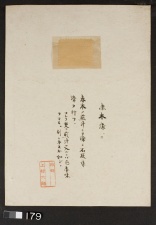Difference between revisions of "Akagi (Sandalwood) - center (179 C)"
Jump to navigation
Jump to search
(username removed) |
(username removed) |
||
| Line 5: | Line 5: | ||
| 179 | | 179 | ||
|- | |- | ||
| − | ! scope="row"| | + | ! scope="row"|Uemura number / title |
| − | | | + | | ; "Haze-some 25" |
|- | |- | ||
! scope="row"|Folder location | ! scope="row"|Folder location | ||
| Line 44: | Line 44: | ||
| - | | - | ||
|- | |- | ||
| − | ! scope="row"| | + | ! scope="row"|Uemura's notes |
| By completing the dying process with re-soaking the fabric into the dye bath, the resultant color would be more red as shown in the previous examples in the M.151. | | By completing the dying process with re-soaking the fabric into the dye bath, the resultant color would be more red as shown in the previous examples in the M.151. | ||
|- | |- | ||
| − | ! scope="row"| | + | ! scope="row"|Uemura's date |
| Kyoto | | Kyoto | ||
|} | |} | ||
| − | [[Category: | + | [[Category:Uemura dye archive]] |
Revision as of 07:18, 24 July 2013
| Museum number | 179 |
|---|---|
| Uemura number / title | ; "Haze-some 25" |
| Folder location | 3rd shelf |
| Sample location | center (179 C) |
| Fiber type | silk |
| Color | beige |
| Dyestuff (Japanese common name) | 赤木 : Akagi |
| Dye (English common name) | Rose wood |
| Dyestuff (botanical name) | Bischofia javanica Blume |
| Plant part | heartwood (?) /dried (?) |
| Dyestuff extraction | boiled in water |
| Auxiliary agent in dye bath | - |
| Mordant | lime water |
| Other auxiliary agent | - |
| Uemura's notes | By completing the dying process with re-soaking the fabric into the dye bath, the resultant color would be more red as shown in the previous examples in the M.151. |
| Uemura's date | Kyoto |
